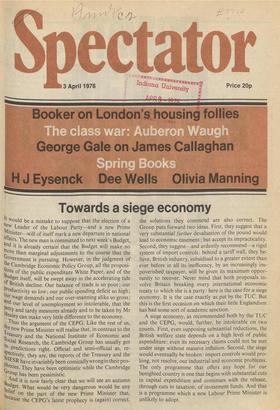Towards a siege economy
It would be a mistake to suppose that the election of a new Leader of the Labour Party—and a new Prime Minister—will of itself mark a new departure in national affairs. The new man is committed to next week's Budget, and it is already certain that the Budget will make no more than marginal adjustments to the course that the Government is pursuing. However, in the judgment of the Cambridge Economic Policy Group, all the proposi- t,t,°ns of the public expenditure White Paper, and of the Budget itself, will be swept away in the accelerating tide °f British decline. Our balance of trade is so poor; our Productivity so low; our public spending deficit so high; °lir wage demands and our over-manning alike so gross; and our level of unemployment so intolerable, that the PettyI and tardy measures already and to be taken by Mr Healey can make very little difference to the economy. t Thus the argument of the CEPG. Like the rest of us, Tile new Prime Minister will realise that, in contrast to the Social and the National Institute of Economic and its Research, the Cambridge Group has usually got La' s predictions right. Official and semi-official as, re- tip,e,,._etivelY, they are, the reports of the Treasury and the „,_'SR have invariably been comically wrong in their pro- phecies. They have been optimistic while the Cambridge Group has been pessimistic. And it is now fairly clear that we will see an autumn tiuicl, get. What would be very dangerous would be any belief on the part of the new Prime Minister that, because the CEPG's latest prophecy is (again) correct, the solutions they commend are also correct. The Group puts forward two ideas. First, they suggest that a very substantial further devaluation of the pound would lead to economic easement; but accept its impracticality.
Second, they suggest—and ardently recommend a rigid system of import controls: behind a tariff wall, they be- lieve, British industry, subsidised to a greater extent than ever before in all its inefficency, by an increasingly im- poverished taxpayer, will be given its maximum oppor- tunity to recover. Never mind that both proposals in- volve Britain breaking every international economic treaty to which she is a party: here is the case for a siege economy. It is the case exactly as put by the TUC. But this is the first occasion on which their little Englandism has had some sort of academic sanction.
A siege economy, as recommended both by the TUC and the CEPG, would, further, be intolerable on two counts. First, even supposing substantial reductions, the British welfare state depends on a high level of public expenditure: even its necessary claims could not be met under siege without massive inflation. Second, the siege would eventually be broken : import controls would pro- long, not resolve, our industrial and economic problems. The only programme that offers any hope for our benighted country is one that begins with substantial cuts in capital expenditure and continues with the release, through cuts in taxation, of investment funds. And that is a programme which a new Labour Prime Minister is unlikely to adopt.


































